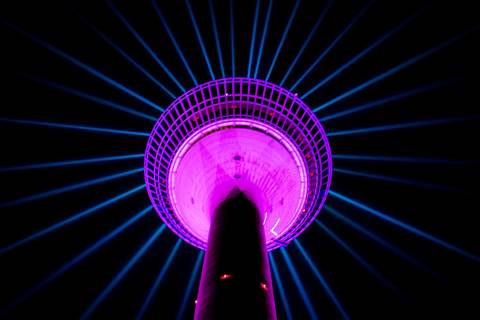Behinde the Hype: what 5G means to Real Estate
Although I have the habit of always staying informed and adopting the routine of having breakfast in front of the digital press, one cannot help but have the feeling of not being able to cover everything. Information travels so fast that it is impossible to assimilate it in its entirety. In addition, I am not a person to settle for headlines, and not only for an interest in delving into the news but because, in the midst of a maelstrom of disinformation through information, giving absolute veracity to the words of a single headline can be an exercise in reckless recklessness. Luckily, I always take advantage of the summer to be able to read articles that, with the maelstrom of day to day, I have discarded during the previous weeks. Luckily, there is technology, which allows us to save news on our devices to be able to read at any other time. And so it was, as a few days ago, you can read an article in El Periódico dedicated to the expansion of 5G around the world.
This article referred to the "GlobalMobile Economy Report 2021" presented at the latest edition of the Mobile World Congress, where the newspaper highlighted the data that referred to the boost of 5G technology in the wake of the pandemic. Since 2019 the number of 5G networks has gone from three in South Korea to 165 networks in more than 65 countries worldwide. Undoubtedly, the data was so remarkable and motivating that the following internal reflection soon appeared: 'And how can this affect the professional sector in which I move? How can the development of 5G in Real Estate help? '.
The emergence of new connected devices and the large amount of data demanded by video transmissions make the bandwidth and speed we need in our connections increasing. The development of the implementation of 5G will mean the end of the irregular service of connections in busy areas and will promote perfect connectivity for our devices; and I do not only mean mobile devices, computers or tablets, but also those encompassed within the technology called: Internet of Things (IOT) that allows us to keep connected from our toothbrush to our vehicles.
Following this reflection, I believe that in the real estate sector 5G technology paves the way to be able to develop smarter smart homes and better-connected remote offices. Interruptions during video calls, as well as any type of delay in communications should tend to disappear with this new technology.
According to the GSMA's "The Mobile Economy" report, the goal of 5G technology is to bring speeds of approximately 10 gigabits per second to our phones; a speed up to 600 times faster than what we currently enjoy with 4G. The technology will minimize delays in data transfers, in this way we could use our mobile devices as video intercoms connected to smart doorbells.
Because the exchange of information is instantaneous, you could also send and view ultra-sharp 360º tours within a 4K quality property. I leave a fact as an example to be able to get an idea of this change in speed: currently, with 4G technology, it takes an average of 8.6 minutes to download a 3GB movie with DVD quality; while with 5G technology, the same movie takes as little as 2.6 seconds to download.
So, is 5G technology only going to bring us more speed? As I heard a few days ago on an MSNBC podcast, Anne Chow, executive director of AT&T Business pointed out that '... 5G is really the lever of change of the next generation of connectivity alongside the innovation of the devices. It will improve all facets of our lives. All industries will be able to innovate with production, logistics, services... thanks to 5G'technology. I suppose that, at this point in the article, you may be wondering what my specific conclusions were regarding the influence of 5G on real estate and how this technology can benefit the real estate sector; so, I am going to list them and invite you to reflect on them with me:
Smarter homes and buildings
5G technology will allow more devices, such as home thermostats, security monitors or light bulbs, to be monitored at all times, having just-in-time information on all of them. It would also eliminate the overload issues that 4G or Wi-Fi networks suffer as more devices are added in the same building. As far as the commercial sector is concerned, owners can find in 5G a quick answer to possible service or logistics problems.
Fault-free remote offices
In my case, and due to my profession, I find myself in the circumstance of having to travel constantly and improvise my office at any time and place: an airplane terminal, a cafeteria, a train car ... This fact forces me to work in the cloud with a large amount of data. Long delays in accessing documents and programs from the cloud are still common with 4G technology, but with 5G this handicap could be eliminated.
Artificial Intelligence (AI)
5G is likely to lead to new tools that save us time and rely on artificial intelligence, including software that can automatically recognize a home's features from photographs and enter them into descriptions on property listings for sale or rent.
A better augmented reality
With many real estate operations currently managed digitally, augmented reality could take off as a more immersive way to view a property, including overlaying images and text in a space within the real world. Buyers can change furniture and design features in 3D while looking at the interior of a property with their smartphone. For example, RealAR, an augmented reality startup based in Australia, offers an application that can convert building plans into 3D constructions so that potential buyers can already see the spaces virtually. With faster connections and more bandwidth, 5G technology could drive innovation around augmented reality.
Flexibility to live and work from anywhere
With 5G, rural areas can be just as well connected as any big city, allowing people to move further and further afield while still having access to our jobs or healthcare through online support services.
5G technology is also crucial to bring about the arrival of more autonomous vehicles. The widespread acceptance of self-driving cars could influence home searches by allowing commuters to offices to perform other tasks while the car takes us to work. In this regard, 5G is considered imperative for a wider deployment of autonomous vehicles, because it will allow cars to communicate wirelessly and instantaneously with each other, sharing data on road conditions for vehicle and passenger safety. It is likely that the first iteration will be implemented by transport companies or car rental as a robotaxi, something we have already seen in films such as Total Challenge or The Fifth Element.
New revenue streams
The implementation and development of 5G technology requires more antennas and amplifiers because their signals travel shorter distances than those of 4G networks. As a result, property investors can unlock new revenue streams by leasing rooftops and rooftops,especially in large cities. National and regional telecommunications operators are looking to place antennas and transmitters in new buildings with the aim of being able to expand the provision of their 5G services
In short, the development of smart city infrastructures together with the technology itself is offering new challenges and opportunities that companies and societies will have to solve as 5G technology advances by leaps and bounds. The momentum behind this new era in connectivity continues to grow in a scenario in which, 5G, could give us a series of tools with which to improve the way we live and work. It is indisputable to think that staying connected has become crucial, and this need will continue to grow day by day.
David Granell Moreno
CEO











